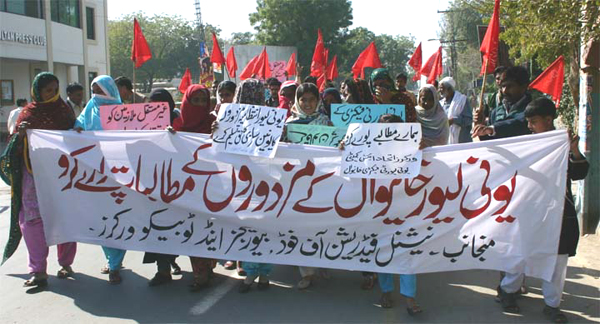The Unilever CSR Chronicles III: A Casual Journey Down the Path to Growth
Posted to the IUF website 03-Feb-2009Share this article.

Unilever's "Path to Growth" leads to luxury condominiums in Hoboken, New Jersey, to Khanewal, Pakistan � and to more places still.
Lipton once had multiple production sites for its tea products in the United States. The famous factory in Hoboken, New Jersey has since been converted into condominium apartments selling for as much as USD 1.5 million.
In 2002, Unilever closed its Lipton plant in Santa Cruz, California, after deciding to centralize its US Lipton manufacturing in Suffolk, Virginia. Generous state and municipal grants for "site development" and "workforce training" (and low Virginia taxes) undoubtedly helped spur the decision. According to the official press release of the Governor of Virginia, "The decision was made as part of Unilever's Path to Growth strategy that includes consolidating production into fewer plants in order to build a world-class supply chain." A strike the previous year against excessively long working hours by the Teamsters who organized the Lipton plant in Independence, Missouri may also have been a factor � workers complained of working 16-hour days followed by 12-hour shifts. Unilever isn't saying, and if they did, there would be grounds for skepticism.
In 2002, the IUF-affiliated CMU led a long fight against the closure of Unilever's Lipton plant in Mabole, Sri Lanka which saw 500 jobs eliminated. In the same press release, Unilever blamed the closure on, alternately, high labour costs and� their inability to import teas for blending. Challenged on the grounds for the closure, the company stated "Unilever Ceylon built a successful business in Sri Lanka by consistently investing in people, by gaining deep insight into consumers, by investing heavily in establishing strong brands that are now part of everyday lives of Sri Lankans and by developing a distribution system envied and replicated by competitors. We are not about to give this up.'' They disposed of the people, but didn't give up making tea � the jobs were simply outsourced.
When Unilever abruptly closed one of its two Lipton factories in Pakistan last year they dispensed entirely with the press releases. The Lipton Karachi plant employed 122 permanent workers�and 450 casual workers sourced from labour hire agencies. The number of permanent workers was apparently deemed to be too high, so production was transferred to a warehouse around the corner, employing 100% outsourced, casual hires.
In Pakistan, that left the Lipton factory in Khanewal, Punjab, as the last directly owned and operated Lipton plant in a nation of tea drinkers. At Khanewal, there are 22 permanent workers, and 723 workers sourced from labour hire agencies.
Determined to challenge a hiring regime which pays casuals one third the daily wage of the permanent employees and offers no job security, no overtime pay, and no health and social security benefits, the workers last year formed the Unilever Mazdoor Union Khanewal. Supported by the IUF-affiliated National Federation of Food, Beverage and Tobacco Workers of Pakistan (NFFBTW), the union is assisting contract agency workers to file petitions in the Labour Court to secure their right to permanent employment.
On January 28 the Khanewal workers marched from the factory gate to the district labour office to demand that that the law be respected. Pakistan's legislation states that workers with 9 months of continuous service must be granted permanent status. Workers have been employed at Khanewal, on average, for 15 years, and in some case many more.

On February 2, the National Federation of Food, Beverages and Tobacco
Workers organized a rally in support of the Lipton workers at the local press club. Women workers from biscuit factories and other NFFBTW officers and members joined the tea workers.

Women biscuit workers demand "Meet the demand of the Unilever Khanewal Workers!"
You can support the Khanewal workers' struggle for justice - CLICK HERE to send a message to Unilever.
